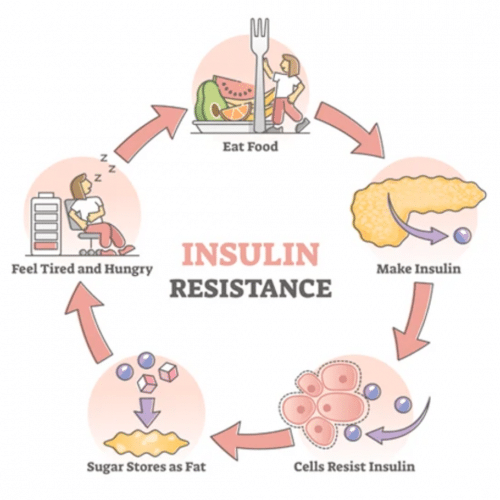Written by Sabine Hoadley, Bsc (Hons), Lead Exercise Scientist
Insulin resistance is a metabolic disorder that can go relatively unnoticed until it develops into further serious health complications. Across the UK, it is estimated that over 2.4 million people have some sort of insulin resistance based on blood sugar levels (1)
Insulin resistance is most commonly linked with type 2 diabetes, but you can also have insulin resistance if you have type 1 diabetes, or another type of diabetes (2).
Resistance often develops gradually and does not cause noticeable symptoms at first, yet it is imperative that early detection and intervention is done to prevent potential insulin resistance from developing into conditions that may seriously harm your health.
Most importantly, research has consistently shown that for some people, combined lifestyle interventions – including diet, physical activity and sustained weight loss – can be effective in reducing the risk of type 2 diabetes by about 50%.
What is insulin?
Before we talk about insulin resistance, we must first understand what insulin is. You may have heard it talked about before in the context of diabetes.
Insulin is an essential hormone that helps your body turn food into energy and manages your blood sugar levels (3).
Insulin release is triggered by an increase in blood glucose (sugar) levels after you eat. Following the release of insulin into the bloodstream, that glucose will then be taken up into your cells and ready to make energy (4). Insulin therefore plays a crucial role in regulating blood sugar levels.

What is insulin resistance?
Insulin resistance is where normal or high levels of insulin no longer lead to a normal biological response in the body. This means that your body is no longer receptive to the effects on insulin. This is bad because it means that the body is not responding to insulin in the way that it should. Insulin is normally responsible for stimulating the transport of sugar in your bloodstream into your cells, so that energy can be made.
What causes insulin resistance?
- High levels of fat around your liver (fatty liver disease) and pancreas
- High body fat percentage
- Being overweight or obese
Obesity is the most common cause of body insulin resistance and type 2 diabetes. Being overweight (BMI >25) raises the risk of developing type 2 diabetes by a factor of 3 (5).
It is therefore very important to manage body weight to ensure that this does develop into chronic diseases such as type 2 diabetes.
Further complications of insulin resistance
Insulin resistance is closely associated with other health complications, including cardiovascular disease.
Research has shown that insulin resistance can significantly increase the risk of cardiovascular disease. This is due to the fact that resistance is likely to cause hyperglycaemia (elevated blood glucose levels), dyslipidaemia (high cholesterol or fat in the blood), damaged blood vessel walls and chronic inflammation (6).
It is imperative to address insulin resistance early on to prevent further health complications. The alarmingly high prevalence of insulin resistance in the UK may be attributable to sedentary lifestyles, poor diets, lack of exercise and rising rates of obesity.
Signs of Type 2 Diabetes
A lot of people don’t get any signs or symptoms of type 2 diabetes – or don’t notice them. Symptoms can include (7):
- Weeing a lot, especially at night.
- Being really thirsty.
- Feeling more tired than usual.
- Losing weight without trying to – and getting thinner.
- Genital itching or thrush.
- Cuts and wounds taking longer to heal.
- Blurred eyesight.
How can you reduce insulin resistance?
Research has shown that an 8% reduction in body weight can lead to an 81% reduction in liver fat content, and this is enough to shift the response from severe insulin resistance to near normal levels of insulin sensitivity (5).
Bringing blood glucose under control is pertinant to reducing your risk of diabetes.
How can we help at Uniquely Health?
At Uniquely Health, we offer comprehensive blood testing that can identify whether there are any abnormalities in your blood glucose levels.
Our GP will thoroughly analyse your blood test results, in combination with your clinical history and background, to explore your risk of both Type 2 diabetes and prediabetes, and help you to understand what your current health profile means for you.
The good news is that there is a plethora of lifestyle factors that can both modify your risk of getting Type 2 or prediabetes. If you are already managing Type 2 or prediabetes, then you can make changes to your lifestyle that can manage your condition.
Our team of clinicians are here to put together a plan that will help you with the following:
- Cardio routine that will improve your blood glucose regulation
- Strength routine that will support you to increase your muscle mass which acts as a natural ‘sink’ for glucose
- Meal plan to manage and control your blood sugar levels, and information about how you can modify your existing habits to improve your glucose control
- Lifestyle tips to support a longer, healthier life
Key Conclusions
1. Insulin resistance occurs when the body fails to respond normally to normal or high insulin levels, hindering the transport of sugar from the bloodstream into cells for energy production.
2. It is common for insulin resistance to be overlooked, yet it is something that poses serious health risks if left to develop into further complications such as Type 2 diabetes.
3. The good news is that you can change parts of your lifestyle to help in the prevention and management of such conditions.
If you are looking for support increasing your healthspan, book a complimentary call with our team to discuss how we can help you.
- Diabetes UK, 2022. How many people in the uk have diabetes? Available at <https://www.diabetes.org.uk/about-us/about-the-charity/our-strategy/statistics> Accessed 19th March 2024
- Diabetes UK, 2022. Insulin Resistance, Available at <https://www.diabetes.org.uk/guide-to-diabetes/managing-your-diabetes/treating-your-diabetes/insulin/resistance> Accessed 19th March 2024
- Wilcox, G., 2005. Insulin and insulin resistance. Clinical biochemist reviews, 26(2), p.19.
- Rahman, M.S., Hossain, K.S., Das, S., Kundu, S., Adegoke, E.O., Rahman, M.A., Hannan, M.A., Uddin, M.J. and Pang, M.G., 2021. Role of insulin in health and disease: an update. International journal of molecular sciences, 22(12), p.6403.
- Petersen, K.F. and Shulman, G.I., 2006. Etiology of insulin resistance. The American journal of medicine, 119(5), pp.S10-S16
- Li, M., Chi, X., Wang, Y., Setrerrahmane, S., Xie, W. and Xu, H., 2022. Trends in insulin resistance: insights into mechanisms and therapeutic strategy. Signal transduction and targeted therapy, 7(1), p.216
- Diabetes UK, 2023. Type 2 diabetes symptoms. Available at <https://www.diabetes.org.uk/diabetes-the-basics/types-of-diabetes/type-2/symptoms> Accessed 20th March 2024.









